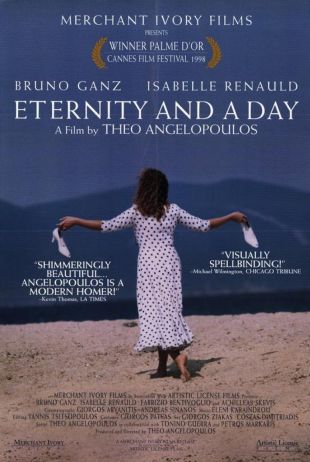One of Theo Angelopoulos's crowning achievements, this beautiful but complex drama interweaves several of the late writer-director's ongoing preoccupations - specifically history, the present, and myth, and how the three not only intersect but perpetually re-contour one another. Ostensibly a loose modernization of Homer's Odyssey - a work that preoccupied Angelopoulos throughout his life - Eternity plays fast and loose with its source material. It substitutes the surrogate paternal-filial relationship between dying poet Alexander (Bruno Ganz) and an unnamed Albanian refugee child (Achileas Skevas) for the blood ties of Odysseus and Telemachus, and a journey toward death in the film for the geographic voyage to Ithaca that Homer dramatizes. Despite the peregrinations of the lead characters, the central transition on display here is an internal one, not an external one. Alexander - a brilliant scholar who never learned to communicate his feelings, and never gave his wife or daughter the attention that they sought and deserved - comes face-to-face with his own emotional neglect in a short, intense period of time. He is given one final opportunity to share himself with another human being - the aforementioned immigrant boy - before his life ends. This is an intensely challenging film, laden with symbolism from first scene to last, and its unusual cinematographic blocking is masterful: Angelopoulos leans heavily on long, gliding takes, often juxtaposing the contemporary and the historic in a single panoramic shot and flowing intuitively sans declamation from one time frame into another. Equally admirable is the bravura visual storytelling technique that takes center stage; per his standard m.o., the artist uses only sparse dialogue and communicates virtually everything vital that he needs to through his characters' wordless interactions. As is customary for an Angelopolous film, we also get a succession of haunting images that take on an almost mythic resonance, such as that of a fence at the Algerian border, strung with the bodies of children attempting to escape. Many of those used to commercial American movies will be dumbfounded by this picture. However, those willing to invest the requisite time and energy will find it exhilarating and refreshing, particularly its painstakingly deliberate pace and its refusal to provide a conventional wrap-up to Alexander's story. Angelopoulos eventually moves into an oblique, metaphoric realm that makes perfect sense and satisfies on a symbolic level, even as it deliberately leaves a few literal questions about the hero's life unanswered. Like Edward Yang's Yi-Yi, made two years later, this film unequivocally demonstrated to the world that groundbreaking cinematic technique was alive and well at the end of the 20th Century. Eternity provides a welcome and much-needed antidote to the Hollywood approach of offering lightning-clip, dumbed-down narratives, served in dull, pre-packaged formulas. The picture deservedly won the Golden Palm at the 1998 Cannes Film Festival. Sadly, the peerless Angelopoulos would make only two additional features before his tragic, senseless death from a road accident at age 76 in January 2012.

Eternity and a Day (1998)
Directed by Théo Angelopoulos
Genres - Drama |
Sub-Genres - Psychological Drama, Road Movie |
Release Date - May 28, 1999 (USA) |
Run Time - 134 min. |
Countries - France, Greece, Italy |
MPAA Rating - NR
Share on